- Home
- Isabel Allende
Ripper Page 2
Ripper Read online
Page 2
Ryan had been a Navy SEAL—a former member of SEAL Team Six, the unit that in May 2011 launched the assault on Osama bin Laden’s compound in Pakistan. In fact, one of Ryan’s former teammates would be the one to kill the Al-Qaeda leader. When he and Indiana met, however, Ryan could not have known this would happen two years later; no one could, except perhaps Celeste Roko, by studying the movement of the planets. Ryan was granted an honorable discharge in 2007 after he lost a leg in combat—an injury that didn’t stop him continuing to compete as a triathlete, as he told Indiana. Up to this point she had scarcely looked at Ryan, focused as she was on the dog, but now she noticed that he wore only one shoe; his other leg ended in a curved blade.
“It’s called a Flex-Foot Cheetah—they model it on the way big cats run in the wild,” he explained, showing her the prosthesis.
“How does it fit?”
He hiked up the leg of his pants, and she studied the contraption fastened to the stump.
“It’s carbon fiber,” Ryan explained. “It’s so light and perfect that officials tried to stop Oscar Pistorius, a South African double amputee, from competing in the Olympics because they said his prostheses gave him an unfair advantage over other runners. This model is designed for running,” he went on, explaining with a certain pride that this was cutting-edge technology. “I’ve got other prosthetics for walking and cycling.”
“Doesn’t it hurt?”
“Sometimes. But there’s other stuff that hurts more.”
“Like what?”
“Things from my past. But that’s enough about me—tell me about you.”
“Sorry, but I haven’t got anything as interesting as a bionic leg,” Indiana confessed, “and I’ve only got one scar, which I’m not going to show you. As a kid, I fell on my butt on some barbed wire.”
Indiana and Ryan sat in the park, chatting about this and that under the watchful eye of Attila. She introduced herself—half joking, half serious—by telling him she was a Pisces, her ruling planet was Neptune, her lucky number 8, her element water, and her birthstones, silver-gray moonstone, which nurtures intuitive power, and aquamarine, which encourages visions, opens the mind, and promotes happiness. Indiana had no intention of seducing Ryan; for the past four years she had been in love with a man named Alan Keller and had chosen the path of fidelity. Had she wanted to seduce him, she would have talked about Shakti, goddess of beauty, sex, and fertility, since the mere mention of these attributes was enough to overcome the scruples of any man—Indiana was heterosexual—if her voluptuous body were not enough. Indiana never mentioned that Shakti was also the divine mother, the primordial life force, the sacred feminine—as these roles tended to put men off.
Usually Indiana didn’t tell men that she was a healer by profession; she had met her fair share of cynics who listened to her talk about cosmic energy with a condescending smirk while they stared at her breasts. But somehow she sensed she could trust this Navy SEAL, so she gave him a brief account of her methods, though when put into words they sounded less than convincing even to her ears. To Ryan it sounded more like voodoo than medicine, but he pretended to be interested—the information gave him a perfect excuse to see her again. He told her about the cramps he suffered at night, the spasms that could sometimes bring him to a standstill in the middle of a race. Indiana prescribed a course of therapeutic massage and a diet of banana and kiwifruit smoothies.
They were so caught up in the moment that the sun had already begun to set when Indiana realized that she was going to miss the ferry back to San Francisco. She jumped to her feet and said good-bye, but Ryan, explaining that his van was just outside the park, offered to give her a ride—after all, they lived in the same city. The van had a souped-up engine, oversize wheels, a roof rack, a bicycle rack, and a tasseled pink velvet cushion for Attila that neither Ryan nor his dog had chosen—Ryan’s girlfriend Jennifer Yang had given it to him in a fit of Chinese humor.
Three days later, unable to get Indiana out of his mind, Ryan turned up at the Holistic Clinic just to see the woman with the bicycle. She was the polar opposite of the usual subjects of his fantasies: he preferred slim Asian women like Jennifer Yang, who besides having perfect features—ivory skin, silken hair, and a bone structure to die for—was also a high-powered banker. Indiana, on the other hand, was a big-boned, curvaceous, good-hearted typical American girl of the type that usually bored him. Yet for some inexplicable reason he found her irresistible. “Creamy and delicious” was how he described her to Pedro Alarcón, adjectives more appropriate to high-cholesterol food, as his friend pointed out. Shortly after Ryan introduced them, Alarcón commented that Indiana, with her ample diva’s bosom, her blond mane, her sinuous curves and long lashes, had the larger-than-life sexiness of a gangster’s moll from a 1970s movie, but Ryan didn’t know anything about the goddesses who’d graced the silver screen before he was born.
Ryan was somewhat surprised by the Holistic Clinic—having expected a sort of Buddhist temple, he found himself standing in front of a hideous three-story building the color of guacamole. He didn’t know that it had been built in 1940 and for years attracted tourists who flocked to admire its art-deco style and its stained-glass windows, inspired by Gustav Klimt, but that in the earthquake of 1989 its magnificent facade had collapsed. Two of the windows had been smashed, and the remaining two had since been auctioned off, to be replaced with those tinted glass windows the color of chicken shit favored by button factories and military barracks. Meanwhile, during one of the building’s many misguided renovations, the geometric black-and-white-tiled floor had been replaced with linoleum, since it was easier to clean. The decorative green granite pillars imported from India and the tall lacquered double doors had been sold to a Thai restaurant. All that remained of the clinic’s former glory was the wrought-iron banister on the stairs and two period lamps that, if they had been genuine Lalique, would probably have suffered the same fate as the pillars and the doors. The doorman’s lodge had been bricked up, and twenty feet lopped off the once bright, spacious lobby to build windowless, cavelike offices. But as Ryan arrived that morning, the sun shimmered on the yellow-gold windows, and for a magical half hour the space seemed suspended in amber, the walls dripping caramel and the lobby fleetingly recovering some of its former splendor.
Ryan went up to Treatment Room 8, prepared to agree to any therapy, however bizarre. He half expected to see Indiana decked out like a priestess; instead she greeted him wearing a white coat and a pair of white clogs, her hair pulled back into a ponytail and tied with a scrunchie. There was nothing of the sorceress about her. She got him to fill out a detailed form, then took him back out into the corridor and had him walk up and down to study his gait. Only then did she tell him to strip down to his boxer shorts and lie on the massage table. Having examined him, she discovered that one of his hips was slightly higher than the other, and his spine had a minor curvature—unsurprising in a man with only one leg. In addition she diagnosed an energy blockage in the sacral chakra, knotted shoulder muscles, tension and stiffness in the neck, and an exaggerated startle reflex. In a word, he was still a Navy SEAL.
Indiana assured him that some of her therapies would be helpful, but that if he wanted them to be successful, he had to learn to relax. She recommended acupuncture sessions with Yumiko Sato, two doors down, and without waiting for him to agree, picked up the phone and made an appointment for him with a Qigong master in Chinatown, five blocks from the Holistic Clinic. It was only to humor her that Ryan agreed to these therapies, but in both cases he was pleasantly surprised.
Yumiko Sato, a person of indeterminate age and gender who had close-cropped hair like his own, thick glasses, a dancer’s delicate fingers, and a sepulchral serenity, took his pulse and arrived at the same diagnosis as Indiana. Ryan was advised that acupuncture could be used to treat his physical pain, but it would not heal the wounds in his mind. He flinched, thinking he had misheard. The phrase intrigued him, and some months later, after they had establi
shed a bond of trust, he asked Yumiko what she had meant. Yumiko Sato said simply that only fools have no mental wounds.
Ryan’s Qigong lessons with Master Xai—who was originally from Laos and had a beatific face and the belly of a Laughing Buddha—were a revelation: the perfect combination of balance, breathing, movement, and meditation. It was the ideal exercise for body and mind, and Ryan quickly incorporated it into his daily routine.
Indiana didn’t manage to cure the spasms within three weeks as promised, but Ryan lied so he could take her out and pay for dinner, since by then he’d realized that financially she was bordering on poverty. The bustling yet intimate restaurant, the French-influenced Vietnamese food, and the bottle of Flowers pinot noir all played a part in cementing a friendship that in time Ryan would come to think of as his greatest treasure. He had lived his life among men. The fifteen Navy SEALs he’d trained with when he was twenty were his true family; like him they were inured to rigorous physical exertion, to the terror and exhilaration of war, to the tedium of hours spent idle. Some of his comrades, he had not seen in years, others he had seen only a few months earlier, but he kept in touch with them all; they would always be his brothers.
Before he lost his left leg, the navy vet’s relationships with women had been uncomplicated: sexual, sporadic, and so brief that the features of these women blurred into a single face that looked not unlike Jennifer Yang’s. They were usually just flings, and when from time to time he did fall for someone, the relationship never lasted. His life—constantly on the move, constantly fighting to the death—did not lend itself to emotional attachments, much less to marriage and children. He fought a constant war against his enemies, some real, others imaginary; this was how he had spent his youth.
In civilian life Ryan was awkward, a fish out of water. He found it difficult to make small talk, and his long silences sometimes seemed insulting to people who didn’t know him well. The fact that San Francisco was the center of a thriving gay community meant it was teeming with beautiful, available, successful women very different from the girls Ryan was used to encountering in dive bars or hanging around the barracks. In the right light, Ryan could easily pass for handsome, and his disability—aside from giving him the martyred air of a man who has suffered for his country—offered a good excuse to strike up a conversation. He was never short of offers, but when he was with the sort of intelligent woman he found attractive, he worried so much about making a good impression that he ended up boring them. No California woman would rather spend the evening listening to war stories, however heroic, than go clubbing—no one, that is, except Jennifer Yang, who had inherited not only the infinite patience of her ancestors in the Celestial Empire but also the ability to pretend she was listening when actually she was thinking about something else. Yet from the very first time they met among the sequoias in Samuel P. Taylor State Park, Ryan had felt comfortable with Indiana Jackson. A few weeks later, at the Vietnamese restaurant, he realized he didn’t need to rack his brains for things to talk about; half a glass of wine was all it took to loosen Indiana’s tongue. The time flew by, and when he checked his watch, Ryan saw it was past midnight and the only other people in the restaurant were two Mexican waiters clearing tables with the disgruntled air of men who had finished their shift and were anxious to get home. It was on that night, three years ago, that Ryan and Indiana had become firm friends.
For all his initial skepticism, after three or four months the ex-soldier was forced to admit that Indiana was not just some crazy New Age hippie; she genuinely had the gift of healing. Her therapies relaxed him; he slept more soundly, and the cramps and spasms had all but disappeared. But the most wonderful thing about their sessions together was the peace they brought him: her hands radiated affection, and her sympathetic presence stilled the voices from his past.
As for Indiana, she came to rely on this strong, silent friend, who kept her fit by forcing her to jog the endless paths and forest trails in the San Francisco area, and bailed her out when she had financial problems and couldn’t bring herself to approach her father. They got along well, and though the words were never spoken, she sensed that their friendship might have blossomed into a passionate affair if she wasn’t still hung up on her elusive lover Alan, and Ryan wasn’t so determined to push away love in atonement for his sins.
The summer her mother met Ryan Miller, Amanda Martín had been fourteen, though she could have passed for ten. She was a skinny, gawky girl with thick glasses and a retainer who hid from the unbearable noise and glare of the world behind her mop of hair or the hood of her sweatshirt; she looked so unlike her mother that people often asked if she was adopted. From the first, Ryan treated Amanda with the exaggerated courtesy of a Japanese gentleman. He made no effort to help her during their long bike ride to Los Angeles, although, being an experienced triathlete, he had helped her to train and prepare for the trip, something that won him the girl’s trust.
One Friday morning at seven, all three of them—Indiana, Amanda, and Ryan—set off from San Francisco with two thousand other keen cyclists wearing red AIDS awareness ribbons, escorted by a procession of cars and trucks filled with volunteers transporting tents and provisions. They arrived in Los Angeles the following Friday, their butts red-raw, their legs stiff, and their minds as free of thoughts as newborn babes. For seven days they had pedaled up hills and along highways, through stretches of beautiful countryside and others of hellish traffic. To Ryan—for whom a daily fifteen-hour bike ride was a breeze—the ride was effortless, but to mother and daughter it felt like a century of agonizing effort, and they only got to the finish line because Ryan was there, goading them like a drill sergeant whenever they flagged and recharging their energy with electrolyte drinks and energy bars.
Every night, like an exhausted flock of migrating birds, the two thousand cyclists descended on the makeshift campsites erected by the volunteers along the route, wolfed down five thousand calories, checked their bicycles, showered in trailers, and rubbed their calves and thighs with soothing ointment. Before they went to sleep, Ryan applied hot compresses to Indiana and Amanda and gave them little pep talks about the benefits of exercise and fresh air.
“What has any of this got to do with AIDS?” asked Indiana on the third day, having cycled for ten hours, weeping from sheer exhaustion and for all the woes in her life. “What do I know?” was Ryan’s honest answer. “Ask your daughter.”
The ride may have made only a modest contribution to the fight against AIDS, but it cemented the budding friendship between Ryan and Indiana, while for Amanda it led to something impossible: a new friend. This girl, who looked set to become a hermit, had precisely three friends in the world: her grandfather, Blake Jackson; Bradley, her future boyfriend; and now Ryan Miller, the Navy SEAL. The kids she played Ripper with didn’t fall into the same category; she only knew them within the context of the game, and their relationship was entirely centered around crime.
Tuesday, 3
Amanda’s godmother, Celeste Roko, the most famous astrologer in California, made her “bloodbath” prediction the last day of September 2011. Her daily show aired early, before the morning weather forecast, and repeated after the evening news. At fiftysomething, thanks to a little nip and tuck, Roko looked good for her age. Charming on screen and a dragon in person, she was considered beautiful and elegant by her many admirers. She looked like Eva Perón with a few extra pounds. The set for her TV show featured a blown-up photo of the Golden Gate Bridge behind a fake picture window and a huge model of the solar system, with planets that could light up and be moved by remote control.
Psychics, astrologers, and other practitioners of the mysterious arts tend to make their predictions on New Year’s Eve, but Madame Roko could not bring herself to wait three months before warning the citizens of San Francisco of the horrors that lay in store for them. Her prophecy was of such magnitude that it captured the public imagination, went viral on the Internet. Her pronouncement provoked scathing editorials in the
local press and hysterical headlines in the tabloids, speculating about terrible atrocities at San Quentin State Prison, gang warfare between blacks and Latinos, and an apocalyptic earthquake along the San Andreas Fault. But Celeste Roko, who exuded an air of infallibility thanks to a former career as a Jungian analyst and an impressive number of accurate predictions, was adamant that her vision concerned murders. This provoked a collective sigh of relief among devotees of astrology, since it was the least dreadful of the calamities they had feared. In northern California, the chance of being murdered was one in twenty thousand; it was, everyone believed, a crime that happened to other people.
It was on the day of this prediction that Amanda and her grandfather finally decided to challenge the power of Celeste Roko. They were sick and tired of the influence Amanda’s godmother wielded over the family by pretending that she could foretell the future. Madame Roko was a temperamental woman with the unshakable belief in herself common to those who receive direct messages from the universe or from God. She never managed to sway Blake Jackson, who would have no truck with astrology, but Indiana always consulted Celeste before making important decisions, allowing her life to be guided by the dictates of her horoscope. All too often Celeste Roko’s astrological readings thwarted Amanda’s best-laid plans. When she was younger, for example, the planets had deemed it an inauspicious moment to buy a skateboard but a propitious time to take up ballet—which left Amanda in a pink tutu, sobbing with humiliation.

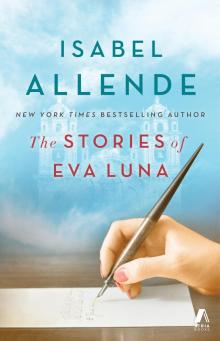 The Stories of Eva Luna
The Stories of Eva Luna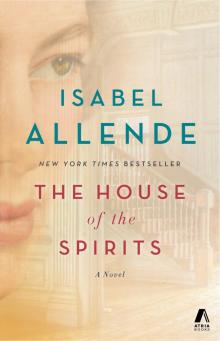 The House of the Spirits
The House of the Spirits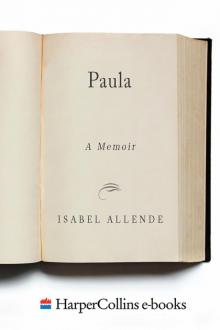 Paula
Paula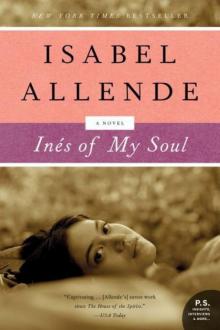 Ines of My Soul
Ines of My Soul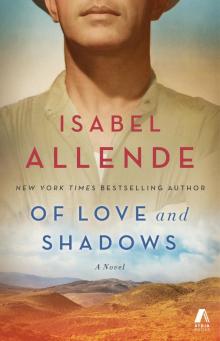 Of Love and Shadows
Of Love and Shadows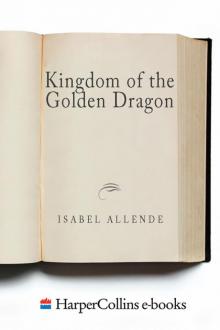 Kingdom of the Golden Dragon
Kingdom of the Golden Dragon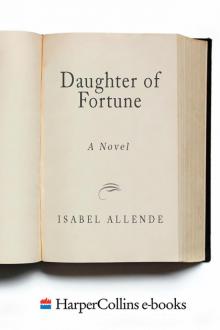 Daughter of Fortune
Daughter of Fortune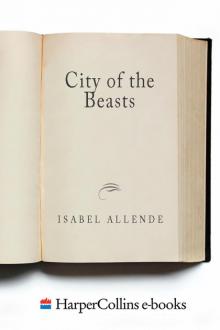 City of the Beasts
City of the Beasts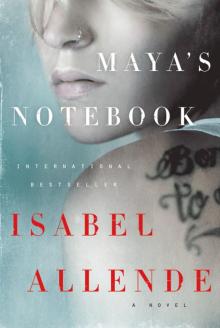 Maya's Notebook
Maya's Notebook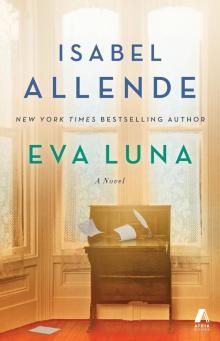 Eva Luna
Eva Luna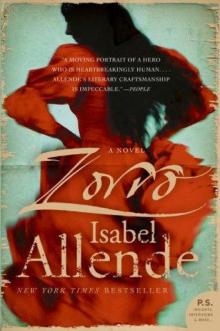 Zorro
Zorro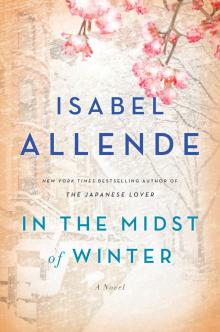 In the Midst of Winter
In the Midst of Winter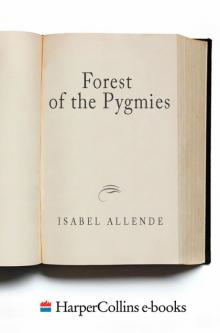 Forest of the Pygmies
Forest of the Pygmies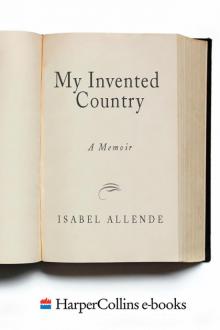 My Invented Country: A Nostalgic Journey Through Chile
My Invented Country: A Nostalgic Journey Through Chile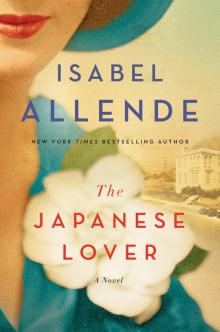 The Japanese Lover
The Japanese Lover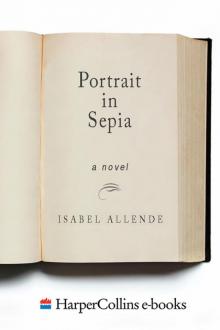 Portrait in Sepia
Portrait in Sepia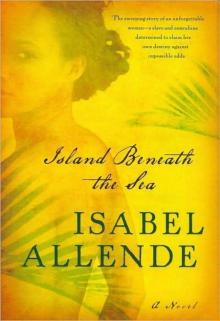 Island Beneath the Sea
Island Beneath the Sea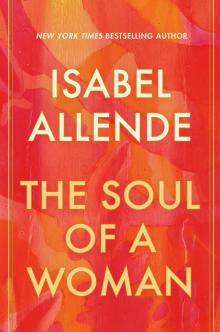 The Soul of a Woman
The Soul of a Woman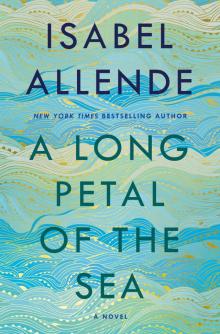 A Long Petal of the Sea
A Long Petal of the Sea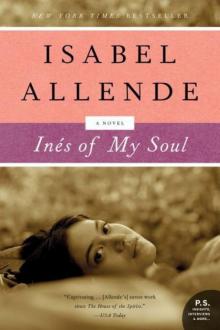 Ines of My Soul: A Novel
Ines of My Soul: A Novel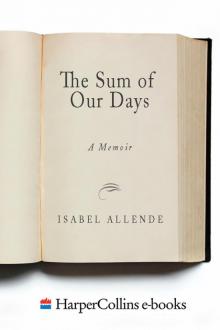 The Sum of Our Days
The Sum of Our Days